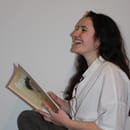In a packed room in the Toronto Reference Library, a crowd of mostly women hang onto every word of the woman sitting at the front of the room, the pleasing timbre of her voice reaching even the back corner where I was sitting. In a way I have never seen before, Roxane Gay captivates her audience the way she captivates her readers, with a candid tone that makes you feel like you’ve been friends for years.
Gay is an author best known for her collection of essays called Bad Feminist, but to those who follow her closely, she is also a feminist, a Marvel comic writer, a Twitter expert and, incidentally, a beautiful speaker. In more of a conversation than an interview with Garvia Bailey on Thursday, Gay spoke on everything from critiques of feminism to The Bachelor to an eager audience—the tickets to the event sold out in a record-breaking 88 seconds.
The connection Gay develops with her audience is almost immediate; laughter rings out in the crowd as she tells the sweet and touching story of her dad being a “superfan” of her work, something she humbly says is what success looks like to her. Her humility comes with a sense of admirable confidence and an ability to never take anything too seriously; when Bailey delves into the fascinating topic of her Twitter account, which has gained attention from the literary world and beyond for her humour, Gay is quick to say that “it’s not that deep.”
“It’s relaxing 80% of the time, but it’s been getting so unpleasant because people are always correcting me,” Gay said. She talks about a time she tweeted about a hotel giving her a chocolate version of her book Difficult Women, and how she tweeted an emoji with a tear because the gesture was so kind it brought her to tears. An unwitting follower then actually-ed her, tweeting that the emoji was the Japanese emoji for sleep—to which Gay said she responded, “Eli, do better.”
You seriously mansplained an emoji to me? Eli. Do better. https://t.co/IvBIYJU9lL
— roxane gay (@rgay) March 16, 2017
Gay seemed to have an eloquent and almost perfect thought for every situation and question thrown at her throughout the night, and to the regular observer, it appears effortless. In some cases, it clearly is; she explains that the decision to pulled her book deal with Simon and Schuster after they gave Milo Yiannopoulos, alt-right hate monger, a $250,000 advance for his upcoming book was simple.
In others, her answer seems to come from years of experience and thought. Gay, in addressing the pressure she feels as one of the only black female authors at her level, talks about the burden black creators carry.
“We have to be able to create flawed black art, we have to be able to be mediocre,” Gay said. She notes that as one of the “firsts,” she has to do well, or else she will be the last—meaning that while white artists can fail and not have that reflect badly on their entire race, black artists are not afforded that privilege.
Even when Gay doesn’t care to have much of an opinion on something, she still ends up giving you a lot to think about. During question period, a woman asks Gay about her thoughts on feminist slogan t-shirts, which gained criticism from feminists, mainly about where the money made from those shirts is going.
Gay’s answer was easy enough. “I don’t care.” She said that feminism is one of the only social movements that is constantly self-critiquing without doing much else. Gay knows it’s important to have those critiques, but her question for the critics is, “What have you done for feminism?”
In what was a stand-out quote for me from the night, Gay acknowledges the importance of capitalism-critical feminism, or Marxist feminism, but says, “…to dismantle capitalism before everyone has been able to experience it is the height of privilege.”
It is precisely this kind of poignant insight that has made Roxane Gay more than just an author to all the people in the room that night, along with the thousands who lined up outside libraries across North America to be able to hear her speak. That, and a quick-witted sense of humour that makes for an unforgettable conversation.
When the conversation circled back to The Bachelor, as it often did, Bailey asked Gay about Ashley Lindsay, who is about to be the first black bachelorette. Gay answered with her classic thoughtful-but-funny style. She said it was an especially important moment to have a black woman represented as this desirable and attractive figure of the bachelorette, because people often see black women as maternal, citing Adele referring to Beyoncé as her “mom” during her Grammy acceptance speech this year.
Here, Gay pauses and smirks. “When I see Beyoncé, I don’t think ‘mommy’ maternally.”
Look out for Gay’s next book, Hunger, coming out in summer of 2017.
(Cover Photo Credit: Flickr/Eva Blue)



